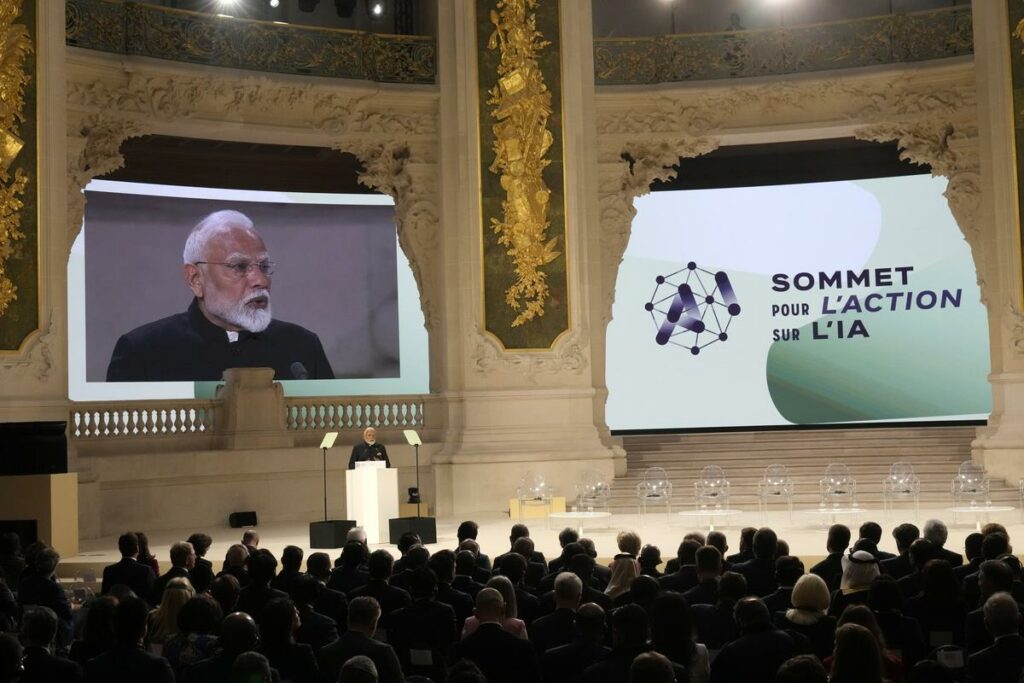
- The AI Action Summit 2025, co-chaired by Macron and Modi, gathered global leaders to discuss AI’s future.
- PM Modi emphasized building unbiased data sets and promoting open-source AI for trust and transparency.
- Macron announced a €109 billion AI investment, stressing the EU’s need to compete while upholding its values.
- The summit faced criticism for lacking strong AI safety commitments, raising concerns among experts.
On February 10 and 11, 2025, France hosted the AI Action Summit at the Grand Palais in Paris. The summit, co-chaired by French President Emmanuel Macron and Indian Prime Minister Narendra Modi, brought together a diverse assembly of global leaders, industry experts, academics, and civil society representatives to deliberate on the evolving landscape of artificial intelligence (AI). It aimed to chart a course for ethical, sustainable, and inclusive AI development.
Key Themes and Objectives
The summit’s agenda was structured around five pivotal themes:
- Public Interest AI: Focusing on developing open public infrastructure to harness AI for societal, economic, and environmental benefits.
- Future of Work: Examining AI’s impact on employment, skill development, and workforce transitions.
- Innovation and Culture: Exploring how AI intersects with cultural industries and fosters innovation.
- Trust in AI: Addressing issues related to AI safety, ethics, and public confidence.
- Global AI Governance: Discussing frameworks for international collaboration and regulation.
These themes underscored the summit’s commitment to leveraging AI advancements while ensuring alignment with ethical standards and public welfare.
Major Announcements and Initiatives
A significant highlight was President Macron’s announcement of a €109 billion private investment in AI over the coming years. He emphasized the European Union’s need to accelerate AI development to remain competitive with nations like the United States and China, all while upholding European values such as copyright protection and child safety.
Additionally, the summit introduced the “AI Convergence” challenges, aiming to foster collaboration among stakeholders to ensure AI benefits society, the economy, and the environment. This initiative reflects a concerted effort to align AI development with the common good.
Global Collaboration and Leadership
Prime Minister Modi’s presence underscored India’s growing prominence in the global AI arena. In his address, he called for global collaboration to harness AI for economic growth, social transformation, and sustainable development. He stressed the need to build quality data sets that are “free from biases” and advocated for the development of open-source systems to enhance trust and transparency. citeturn0search2
UK Technology Secretary Peter Kyle emphasized the importance of “Western, liberal, democratic” nations leading the AI race, subtly cautioning against China’s expanding influence. He highlighted the UK’s scientific expertise as a foundation for spearheading AI advancements.
Critiques and Concerns
Despite the summit’s ambitious goals, it faced criticism for perceived shortcomings in addressing AI safety. A leaked draft of the summit’s declaration was criticized for lacking substantial safety commitments, and experts like Professor Stuart Russell expressed concerns over the omission of key safety measures from previous agreements.
Parallel Events and Cultural Integration
Throughout the “AI Action Week,” numerous parallel events occurred in Paris, including a Business Day at Station F and discussions on AI’s impact on democracy, the environment, information manipulation, and cybersecurity. Art installations and cultural events complemented the summit, emphasizing the integration of AI into various facets of society.
Conclusion
The AI Action Summit 2025 in Paris marked a significant milestone in global efforts to navigate the complexities of artificial intelligence. By convening a diverse array of stakeholders, the summit sought to balance innovation with ethical considerations, aiming to harness AI’s potential for the collective benefit of humanity. While challenges and critiques persist, the summit’s dialogues and initiatives contribute to the ongoing discourse on responsible AI development and governance.
Shashank Pandey holds a Master’s degree in Diplomacy, Law, and Business from O.P. Jindal Global University. He currently works as a Policy Research and Strategic Consultant for the Office of the Deputy Chief Minister and Finance Minister of Manipur. Views expressed are the author’s own.
